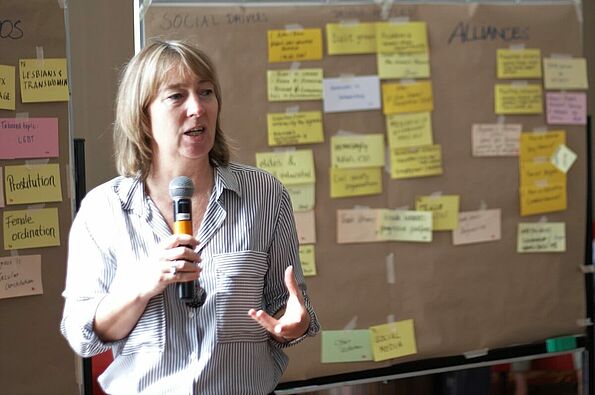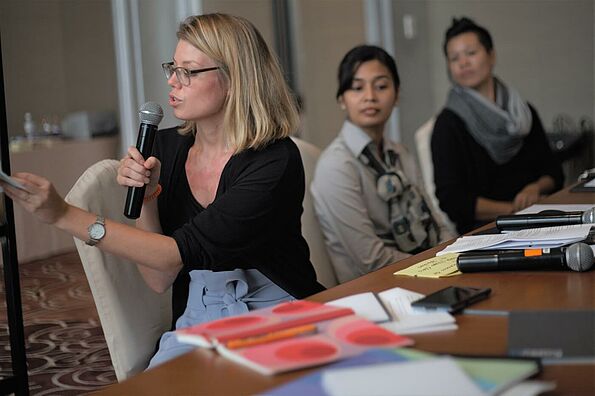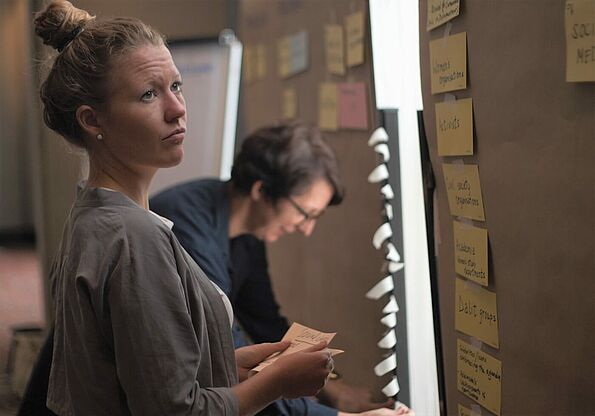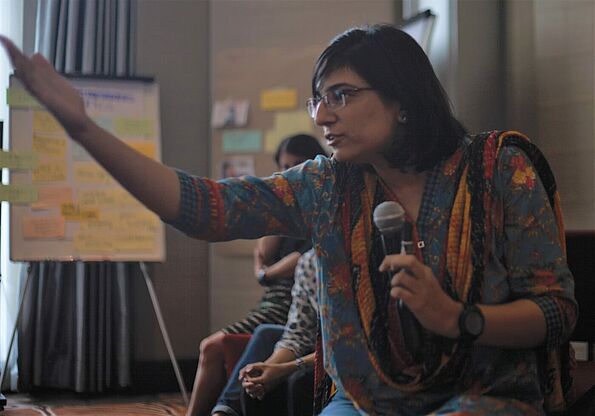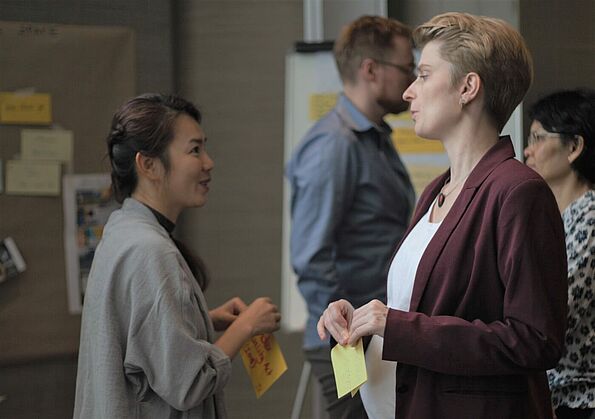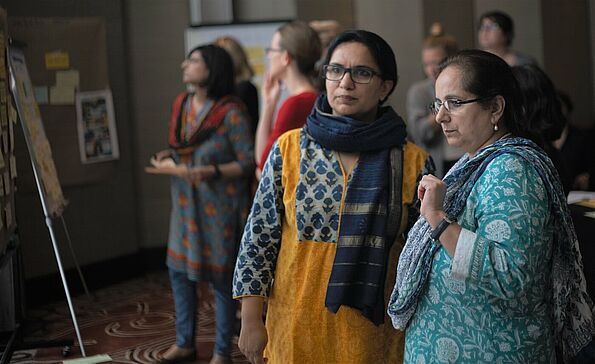Breaking out of silos: conversation on new gender work in FES
The story begins in 2013, in Manila. A workshop takes place, “Breaking new Ground for Gender Equality and Political Feminism.” Staff of FES offices in Asia work together on a strategy for future gender work. Gender equality is a political struggle, they stress. And future work must address the very structures that prevent possibilities for political, economic and social participation across different lines of division, class, race, including gender.
Few years later and inequality continues to rise on a global level, existing divisions along class and racial lines grow stronger while new ones also emerged. Countries in Asia are part of these developments. The changing circumstances and arising consequences have further challenged ongoing efforts to support gender just participation in the arena of economic and political institutions. In their response, a newly announced regional project shapes and informs the ongoing and future work on gender by FES in Asia.
To find out more about the shifts, challenges and plans in pipeline for the new regional project, the team of FES Connect reached out to the FES Office for Regional Cooperation in Asia, which is based in Singapore. We spoke to Natalia Figge, who manages projects on gender equality and migration in the office.
Connect: What does gender equality mean to you and how does it relate to your work at FES?
Natalia Figge: I believe everything should follow the key underlying principle of equal rights for all human beings.
Because of gender roles and assumptions about what makes one female or male, women and girls are discriminated against in health, education, political representation and labour market. This reflects negatively on human development and has repercussions on capabilities and freedom of choice.
So, it is obvious why gender equality is a core objective of our work at FES towards social justice. In Asia, but also globally, we discuss, together with our partners, the introduction of women’s quotas in traditionally male-dominated trade unions; we present Gender Responsive Budgeting as an instrument for gender-equitable cost planning; we deal with aspects of gender in social media as well as with feminist economy and the remuneration of care work; we analyse employment-related migration with an intersectional approach.
Connect: In your observation, what developments pose challenges in the ongoing efforts to achieve gender just participation in the arena of economic and political institutions overall and the Asian region specifically?
NF: Specifically in Asia, where rapid development has also brought higher living standards for millions, we witness growing inequality and exploitation of women. Women continue to disproportionately lack access to quality employment. They often work under precarious and health impairing conditions: low wages, discrimination, sexual harassment and other forms of sexual abuse in the workplace are common. The worrying fact is, that the exploitation of women is deepened by socio-cultural norms, backed by patriarchy and sustained by policies and institutional frameworks based on neo-liberal economic models. Moreover, Asia, like other regions of the world, is plagued by resurgent fundamentalisms, rising militarisation and a return to conservative traditions, leaving only shrinking spaces for civil society and political reformists.
Asia is also experiencing population ageing at an unprecedented pace, due to rapidly falling fertility rates and tremendous improvements in life expectancy. Countries in the region will have to deal with labour force gaps in the relatively short term. Attracting more women to fill more jobs is essential to address this gap. And yet, labour force participation among women has even regressed in some countries in recent years.
Despite having some female heads of state, women’s political representation remains very low in Asia, regardless of a country’s level of economic development or the severity of gender inequality within the country. Women’s political representation is determined largely by institutional redress. The average percentage of women parliamentarians in Asia for example is only 19.2 per cent (single, lower and upper houses).
Connect: What is in the pipeline to address some of these challenges?
NF: FES has, in the last year, critically reviewed its long-standing gender work in Asia, but also in other regions and has come up with the firm intention to make it even more political, more focused, and more innovative. We want to push the envelope and call it political feminism, even though feminism in itself is a political concept. We think women’s political participation, a more critical focus on decent work for all, and more emphasis on gender-just economic models are key to strengthen women in Asia.
For this, we are about to initiate a far-reaching regional project on “Political Feminism in Asia.” The FES offices in Bangladesh, China (Shanghai), India, Indonesia, Pakistan, the Philippines and Thailand will cooperate intensely and bring together progressive, young feminists. We want to facilitate a regional platform for critical debate and theory, which so far is inexistent.
We started with commissioning country studies on the past and present of feminist movements and current trends in feminist debates. The studies on India and Pakistan and China are already available and more are on the way by the end of the year. Firstly, we wanted to understand, where feminist movements came from and what their proponents read and think. In September, we concluded a two-day planning workshop with FES colleagues from the participating countries. When we met, we all agreed on the idea to form an Asian-wide gender-inclusive network of progressive feminists and political economists. Across the network, we hope to inspire regional and maybe later global debates.
We would like to invite our partners to explore agendas for economic equality and the division of labour, while challenging the mainstream thinking within capitalism and neoliberalism. We believe that the new challenging -isms in Asia need feminist answers and solutions.
In short, we facilitate gender transformative work. We want to support feminist and women’s movements to overcome a pertinent critique that gender equality work has been happening in silos. We must reconnect issues and actors and build strategic alliances. Political parties, trade unions, are among the critical spaces to promote and protect women workers’ rights, not just at the workplace but also in their workers’ communities, at country, regional and international levels.
Connect: How do the activities in Asia link to the international work by FES in other parts of the world?
NF: The regional project on Political Feminism in Asia, which is being coordinated by FES Singapore, is part of the division-wide project on political feminism, within the Department for International Development Cooperation at FES in Berlin. This means that akin activities are also being implemented in Africa, the Middle East, Latin America and Asia. In a second phase, we hope to connect the debates in Asia with the other regions of our project. By building bridges for a critical discourse, the project can provide a global platform where feminists can respond to the issues and concerns that economic globalisation raises.
Connect: In what direction is this leading the future work of your office in Asia on gender issues?
NF: The political feminism project in Asia will be a key component of our gender work in Asia. The critical stance that has led to shaping it also informs our ongoing work with partners in the ASEAN region. For example, together with UN Women, FES commissioned a new study which will look at the impact of the ASEAN Economic Integration on women migrant workers. Feminisation of the migrant flows is a consistent feature of intra-regional migration in the ASEAN region and there is a need to understand how labour mobility and regional integration affect women migrant workers. A gap in existing literature prevents us from understanding this link and the study addresses precisely this gap.
We should remember that FES is a value-based organisation, committed to justice, equality and freedom. This requires our work on gender equality to constantly push the boundaries as power relations in politics, society, business and industry realign and enhance inequality among different groups, including on the grounds of gender. So, this is what we will continue to do – trace manifestations of these inequalities to understand what drives them by activating the enormous potential for transformation of dynamic feminist and women’s movements in Asia for a gender just and social change.
About FES Connect
Connecting people, in the spirit of social democracy, we source and share content in English from the German and international network of the Friedrich-Ebert-Stiftung.
